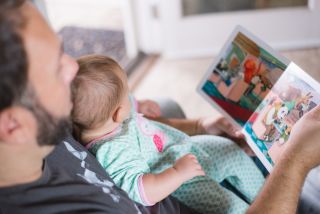Education
The Lost Years of COVID: Learning Words While Stuck at Home
Children's vocabulary increased despite daycare closures.
Posted November 1, 2023 Reviewed by Lybi Ma
It’s become common to hear comments about the lost years of COVID with regard to children’s education and development; it interested me to see a potential gain reflected in some research on children’s language. A group of researchers at the University of Oslo in Norway, the Max Planck Institute for Psycholinguistics in the Netherlands, and scientists from 11 other countries sent surveys to caregivers of infants and toddlers just days after daycares were shuttered, and then again once daycares in their areas were reopened. They were able to collect information about children’s vocabularies and activities during the earliest phases of lockdowns and limitations during that spring. In total, they collected information from 1,742 caregivers representing 12 different languages.

Caregivers in these studies answered questions about how many words their children used and understood and how much time they were spending on activities like reading books, playing games, playing outdoors, and watching or interacting with screens. I’m sure other caregivers will share my lack of surprise that children’s screen time increased during those early days of the pandemic, even if they were too young to be doing any sort of online school. I cannot tell you how many times my children watched Frozen during those early days when any semblance of screen time rules went out the window.
The benefits of reading books
Previous research (during normal times), mostly done in the U.S., shows that talking with children and reading books with them is associated with children having larger vocabularies, and that screen time can be associated with slightly slower increases in vocabulary growth. These results from many countries during COVID closures supported earlier work and gave us some new information. Those children whose caregivers spent more time reading books with them showed larger gains in the number of words they understood, and children who spent more time passively watching screens showed smaller gains in words they knew how to use. While the vocabulary gains were smaller, the children were still learning—there’s no need to feel bad about ourselves for Disney’s help during those stressful days.
Then came the surprising part. Researchers also compared the increase in vocabulary during the daycare closures to what would normally be expected during that period of time and found a larger increase during the closures. Children actually increased their vocabulary size faster during daycare closures than we would have expected them to. The reasons for the increase are not completely clear: Does spending more time with caregivers give children more opportunities to learn new words? Were the caregivers better able to recognize that development due to the amount of time spent with their children? These results don’t directly answer those questions, but I find it heartening to read about any benefit that children may have gained from that period of time, and important to see it reflected in results that have such a diverse group of children represented.
References
Kartushina et al. (2022). COVID-19 first lockdown as a window into language acquisition: associations between caregiver-child activities and vocabulary gains. Language Development Research, 2(1), 1-36. https://doi.org/10.34842/abym-xv34
Bergmann, C., et al. (2022). Young children’s screen time during the first COVID-19 lockdown in 12 countries. Scientific Reports. doi: 10.1038/s41598-022-05840-5.


